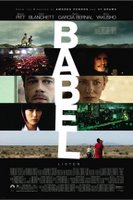Babel (2006)
 Country: USA
Country: USA Dir: Alejandro González Iñárritu
Genre: Drama
Rating:7.5/10
In Amores Perros, A horrific car accident connects three stories, each involving characters dealing with loss, regret, and life's harsh realities, all in the name of love.
A freak accident brings together a critically ill mathematician, a grieving mother and a born-again ex-con in 21 Grams.
and in Babel the last installment of the trilogy, two morrocan boys decide to test a rifle, and from that instant the lives of four separate families on three different continents collide.
Babel is about racial tension, illegal immigrants, adolscent yearnings, perceptions about foreign countries, and the arrogance of the 'ugly' american. This movie unlike its predecessors is less convuluted in its plot while maintaining a multi-narrative approach. Time does flip back and forth but not as much as the previous two [this also reminds me of christopher nolan's memento]. i wonder if the screenplay was written chronographically. if it was, then thanks to its editing, the story comes out as intelligent and compelling as the other two.

Writer Arriaga's strength lies in his ability to create a fractured narrative drama, pieces of which seamlessly come togather by the way of most likely a single act of crime/incidence. The characters portrayed in his stories are ordinary people who are faced with extraordinary circumstances. Inarritu's direction clearly brings out the emotions that these characters undergo. Common traits that can be attributed to arriaga-inarritu films are - remorse, revenge, frustration, impulsiveness, and anxiety. These traits form the basis on which this trilogy revolves around.
The story aside, what makes the film special is its international ensemble, strong acting and solid screenplay. The actors bring all gravitas to the material that grounds the film in what feels like truth, if not necessarily reality. Japanese actor Rinko kikuchi who plays as the deaf-mute girl stands out. The imagery is powerful with its documentary feel to it. and the music by composer gustavo santaolalla [of the motorcycle diaries] is sombre and spare. This movie is sure to make a mark at the oscars.
Note: Personally, I feel the multi-threaded, jangled-up chronology thing has lost its originality and surprise value, ex. in the case of "Crash". But since Inarritu started it with Amores Perros, he seems to have preserved the same narrative effectiveness in Babel..
A freak accident brings together a critically ill mathematician, a grieving mother and a born-again ex-con in 21 Grams.
and in Babel the last installment of the trilogy, two morrocan boys decide to test a rifle, and from that instant the lives of four separate families on three different continents collide.
Babel is about racial tension, illegal immigrants, adolscent yearnings, perceptions about foreign countries, and the arrogance of the 'ugly' american. This movie unlike its predecessors is less convuluted in its plot while maintaining a multi-narrative approach. Time does flip back and forth but not as much as the previous two [this also reminds me of christopher nolan's memento]. i wonder if the screenplay was written chronographically. if it was, then thanks to its editing, the story comes out as intelligent and compelling as the other two.

Writer Arriaga's strength lies in his ability to create a fractured narrative drama, pieces of which seamlessly come togather by the way of most likely a single act of crime/incidence. The characters portrayed in his stories are ordinary people who are faced with extraordinary circumstances. Inarritu's direction clearly brings out the emotions that these characters undergo. Common traits that can be attributed to arriaga-inarritu films are - remorse, revenge, frustration, impulsiveness, and anxiety. These traits form the basis on which this trilogy revolves around.
The story aside, what makes the film special is its international ensemble, strong acting and solid screenplay. The actors bring all gravitas to the material that grounds the film in what feels like truth, if not necessarily reality. Japanese actor Rinko kikuchi who plays as the deaf-mute girl stands out. The imagery is powerful with its documentary feel to it. and the music by composer gustavo santaolalla [of the motorcycle diaries] is sombre and spare. This movie is sure to make a mark at the oscars.
Note: Personally, I feel the multi-threaded, jangled-up chronology thing has lost its originality and surprise value, ex. in the case of "Crash". But since Inarritu started it with Amores Perros, he seems to have preserved the same narrative effectiveness in Babel..


